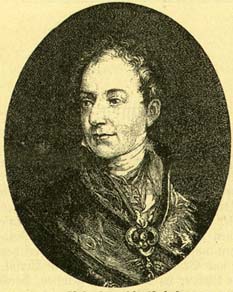Klemens Wenzel von Metternich
|
|
Klemens Wenzel Nepomuk Lothar Fürst von Metternich-Winneberg-Beilstein (May 15, 1773 – June 11, 1858) (sometimes rendered in English as Prince Klemens Metternich) was an Austrian politician and statesman and perhaps the most important diplomat of his era.
Metternich was born in Coblenz into minor Westphalian nobility, and one of his earliest diplomatic coups was to marry the granddaughter of the powerful and wealthy Austrian chancellor Count Wenzel von Kaunitz in 1795. His diplomatic skills soon won him posts as ambassador to Berlin, then in 1806 to Paris.
Following Austria's disastrous defeat by Napoleon in 1809, Metternich was made Austria's Foreign Minister, replacing Johann Philipp von Stadion, and pursued a pro-French policy, going so far as to engineer the marriage of Napoleon to Marie-Louise, Emperor Francis's daughter.
Following Napoleon's defeat in Russia in 1812, Metternich turned to a policy of neutrality, and attempted to mediate a peace between Napoleon and his Russian and Prussian enemies. In June 1813 he famously met with Napoleon at Dresden, and by his own account came away telling the intransigent Emperor that he was lost. Soon after, mediation having failed, Metternich brought Austria into the war against France.
As the war came towards its conclusion in the spring of 1814, Metternich quickly came to the conclusion that no peace with Napoleon was possible, and abandoning ideas of a Bonapartist regency under Marie Louise, came to support a Bourbon restoration, which brought him closer to Castlereagh, the British Foreign Secretary.
Metternich was one of the principal negotiators at the Congress of Vienna. During this period, Metternich came to have a bitter personal enmity with Tsar Alexander I of Russia, whose Polish plans Metternich deeply feared, and who competed with the womanizing Metternich for the affections of the beautiful Wilhelmina von Sagan. Metternich's attempts to form a united front with Viscount Castlereagh and Hardenberg, the Prussian chancellor, to oppose Alexander's plans for a constitutional Kingdom of Poland under his own rule, came to nothing due to Prussia's unwillingness to stand up to Alexander. Metternich then shocked the Prussians by signing an alliance with Castlereagh and Talleyrand, the French envoy, on January 3, 1815, to prevent Prussian annexation of Saxony, which was to be Prussia's compensation for giving up Polish land to Alexander. While this was successful in saving the King of Saxony, Alexander managed to get most of what he wanted in Poland.
At the same time, Metternich worked hard in negotiations with Prussia, Hanover, Bavaria, and Württemberg to resolve the organization of Germany, and the Germanic Confederation (Deutscher Bund) that resulted bore much of the stamp of Metternich's ideas.
Metternich's most notable achievement in the years that followed the Congress was his conversion of the Tsar, who had seen himself as a protector of liberalism, to the protection of the old order, which culminated by the Tsar's decision at the Congress of Troppau in 1820, when the Tsar assented to Metternich's suppression of a Neapolitan rebellion and refused to aid Greek rebels against the Ottoman Empire.
Over the succeeding decades, Metternich came to be seen as a reactionary protector of the rights of Kings and Emperors in this era of rising democratic sentiment, and had a free hand in conducting the Austrian Empire's foreign affairs for some 30 years, especially after Emperor Francis's death in 1835, when his feeble-minded son Ferdinand took the throne.
The Revolutions of 1848, however, marked the end of his rule. Mobs in Vienna demanded his resignation, and he did so on March 13. Metternich and his third wife had to flee to England. Although they returned three years later, and Metternich, although never resuming office, became a close personal advisor to Emperor Franz Joseph. He died in Vienna.
Metternich's conservative views regarding the nature of the state influenced the outcome of the Congress of Vienna. He believed that since the people have become acquianted with the old institutions, national revolutions such as those in France and Greece are illegitimate. The Legitimacy Principle played a vital role in the reinstallation of ancient states such as the Papal States in Italy, and the resurgence of the Bourbon monarchy in France under Louis XVIII. Through the Carlsbad Decrees of 1819, Metternich introduced policing in universities to keep a watch on the activities of professors and students, whom he held responsible for the spread of radical liberal ideas.
Considered an unreliable liar and an amatory dilettante by many of his contemporaries, Metternich has earned the admiration of succeeding generations for his deft management of foreign policy, although his reactionary domestic policies still remain controversial.
Notes
Template:German title Fürstda:Fyrst Metternich de:Klemens Wenzel Lothar von Metternich es:Klemens von Metternich fr:Klemens Wenzel von Metternich it:Klemens von Metternich ja:クレメンス・メッテルニヒ nl:Klemens von Metternich no:Klemens von Metternich sv:Klemens von Metternich

